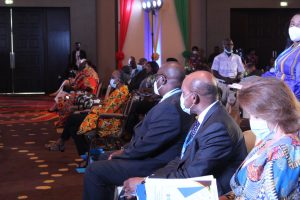NCD Alliance welcomes new Presidential Council on Noncommunicable Diseases as show of political commitment
The NCD Alliance said today’s announcement of a new Presidential Council on Noncommunicable Diseases (NCDs) and a Global Compact on NCDs at a high-level meeting in Ghana today could be a turning point in the fight against chronic diseases, which is responsible for 74 per cent of deaths annually.
Cancer, cardiovascular disease, chronic lung disease, diabetes, and mental health and neurological disorders account for the majority of noncommunicable illness and mortality.
Heads of State, Ministers of Health, WHO Director-General Dr Tedros Adhanom Ghebreyesus, and Global NCD Ambassador Michael Bloomberg today addressed the International Strategic Dialogue on NCDs and Sustainable Development Goals (SDGs).

The meeting sought to raise the priority of NCDs within national and global SDG responses, spotlight strong national leadership on NCDs, and facilitate sharing of knowledge around what it would take to reach SDG 3.4 – reducing by one-third premature mortality from NCDs through prevention and treatment and promoting mental health and well-being by 2030.
Two years into the global COVID-19 pandemic, there can no longer be any doubt about the case for investing in NCDs,” said Katie Dain, CEO of the NCD Alliance.
“COVID-19 has upended health systems, drained economies and disproportionately affected people living with NCDs. This pandemic must be a wake-up call for governments and political leaders to value, prioritise and invest in healthy societies, NCD prevention and strong and resilient health systems.”
The good news is that progress on NCDs is possible, and the returns on investment far outweigh the cost of inaction. 39 million lives could be saved before 2030 with an additional $US18 billion spent annually on implementing packages of cost-effective NCD interventions, tailored to local disease burden and risk factors. This would also generate an average net economic benefit of $2.7 trillion, or $390 per capita, equal to a 19 to one return on investment.”

This data comes from a recent Lancet NCD Countdown 2030 paper, and also shows that nearly all countries – especially low and middle-income countries (LMICs) – can still reach SDG target 3.4 to reduce premature mortality from NCDs like cancer, cardiovascular disease and stroke, chronic respiratory diseases and diabetes by one third by 2030 through the implementation of a cost-effective package of NCD prevention and treatment interventions.
Notably, policies to reduce behavioural risks, such as tobacco use, harmful use of alcohol, and excess sodium intake, would be relevant in nearly every country. These NCD interventions represent a good use of money and yield high returns in terms of lives saved and economic gains.
The Presidential Council on NCDs (NCD Presidential Group) announced today will be a platform for exchange, collaboration and action on NCDs among interested Heads of State and Government. “It could be a game-changer for the global NCD response, given NCDs are a whole-of-government issue demanding the highest level of political leadership,” said Dain.

The President of Ghana will chair the first meeting of the Council which will take place in September during the 77th session of the United Nations General Assembly in New York.
The International NCD Compact 2022-2030 contains strategic priorities to accelerate action and encourage countries to reach SDG targets 3.4 and 3.8 by 2030.
41 million people die every year due to an NCD and annual deaths from NCDs are projected to escalate to 52 million by 2030. To put these figures into perspective, in 2020 annual deaths from tuberculosis, malaria and HIV/AIDS reached 1.5 million, 627,000, and 680,000 respectively.

Deaths attributed to the COVID-19 pandemic, from its beginning in 2019 to April 2022, are nearing six million. Around 60-90 per cent of COVID-19 deaths are among people living with one or more NCD.
Although the NCD burden is universal, low- and middle-income countries (LMICs) are hit the hardest, with over three-quarters of all NCD deaths and over 85 per cent of premature deaths between the ages of 30-70 from NCDs occurring in poorer countries.
Comments